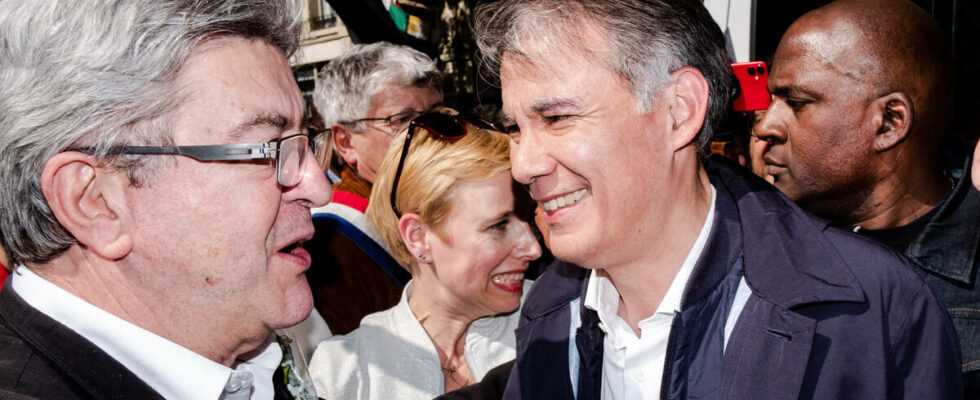An agreement in principle has been found between rebels and socialists. The discussions must continue on the merits this Wednesday morning but the two camps have already agreed on the 70 constituencies which return to the roses. A national council of the PS must now validate the agreement.
On November 7, 2008, Jean-Luc Mélenchon left the Socialist Party. Fourteen years later, the Socialist Party finds Jean-Luc Mélenchon. During the night of Wednesday to Thursday, after hours and hours of discussion, the two camps reached a legislative agreement. After the ecologists and the communists, the roses therefore join the “new popular social and ecological union”, which will bring together the lefts gathered by the rebellious.
“We’ve been kidding ourselves for 10 years, we can’t fix everything in a few hours”, justified a member of the PS delegation after hours of meeting among the rebellious. The discussions blocked in particular on the distribution of the constituencies: the rebellious proposed 70, the Socialists wanted more. “They think they are in another era, commented an insubordinate negotiator crossed in the middle of the militants who were preparing campaign material to send. Do you see Black Baron? It’s 100 times worse.” Way to say that they still saw themselves a little too beautiful after the 1.7% of their candidate when the Socialists replied that they remained more rooted in the territory than all the others on the left. After two days of discussions, the rebels praised the negotiating skills of the camp. But in the end, the Socialists recover well 70 constituencies, excluding Overseas and Corsica.
On Sunday, the greens had prepared the ground by signing the agreement first. They had agreed with the rebellious on the name of the common banner, the New Popular Social and Ecological Union and had given birth to a formulation intended to put everyone in agreement on the biggest point of tension: the European Union. “We will have to be ready to disobey certain European rules […] respecting the rule of law, they concluded. But the Socialists wanted to gain a little more ground by eliminating the word “disobedience”. The discussions on the merits must also continue this Wednesday morning. “It hits internally”, explained a socialist negotiator. The leadership of the PS was on two fronts: on the one hand with the rebellious, on the other with a minority within it which refuses the rally behind Mélenchon and denounces a large ideological gap. A national council must now be convened as soon as possible to validate the agreement.
Hours of discussions that represent nothing on the scale of their history. As between two lovers who find themselves, everything has in fact gone very quickly. The Socialists, however, were initially kept on the sidelines. A few days after the first round, the rebellious, from the top of their 22%, send letters to ecologists and communists to open the chapter of discussions, on their programmatic basis. Socialists get nothing. The same day, so as not to stay on the sidelines, Olivier Faure had planned to reach out to Release. Just before the interview, he confides a little annoyed: “I am surprised that they chose to refuse discussions. These are not ways to do it.” However, once the recorder is on, he says: “You have to get over the resentments that exist.” Since the time that he repeats that his party must open up to others by learning humility, it was necessary to demonstrate it. Like when we make our debut, at the end of the interview, he asks us: “How are you, was it good?”
The PS? “Definitely not”yet responds the rebellious Mathilde Panot the next day in an interview with JDD. It is in fact a small failure: the interviews of the two deputies crossed. That of Faure has had its effect: the rebellious now explain that everyone is welcome, provided they agree on the substance. The PS? “We’ll try”, Jean-Luc Mélenchon answers us the day after his call to the French for the legislative elections. “Elect me Prime Minister”, he launched on BFM. In a café very close to the headquarters where the negotiations are taking place, the rebel reflects: “I really think that socialists no longer want to be crushed by their history.”
Turn everything upside down
But his lieutenants don’t really believe it. Even if there is discussion and reconciliation, they think that the Socialists will never come to them on retirement at 60 or the Sixth Republic, which are among the conditions of the agreement. They will be surprised. On April 27, the two camps meet for the first time. A kind of preliminary interview for the rebellious to verify that the Socialists have changed. The candidates for the rally reassure them: they have indeed turned the page on social democracy to return to the fundamentals of socialism, in other words, before its accommodations to liberalism. After three hours of meeting, the negotiations are officially launched.
Serious things are beginning, with delegations meeting up, taking breaks on their own to consult theirs and suspending meetings when nothing is progressing. Basically, the Socialists have turned everything upside down. Increase in the minimum wage to 1400 euros net per month, ecological planning or even repeal of the El Khomri law? They say yes. For retirement at age 60, they suggest “a first step including taking into account long careers and arduous jobs”. On the European Union, they admit to having “now need a break in the liberal course of European construction”.
“It is an ideological battle that is being played out, analysis Aurélie Trouvé, former director of Attac, now President of the parliament of the Popular Union. It’s amazing how far they’ve come in a few days. In two years, we will not remember the number of constituencies that each had but the clarification on the left on a line of rupture with the system”.
